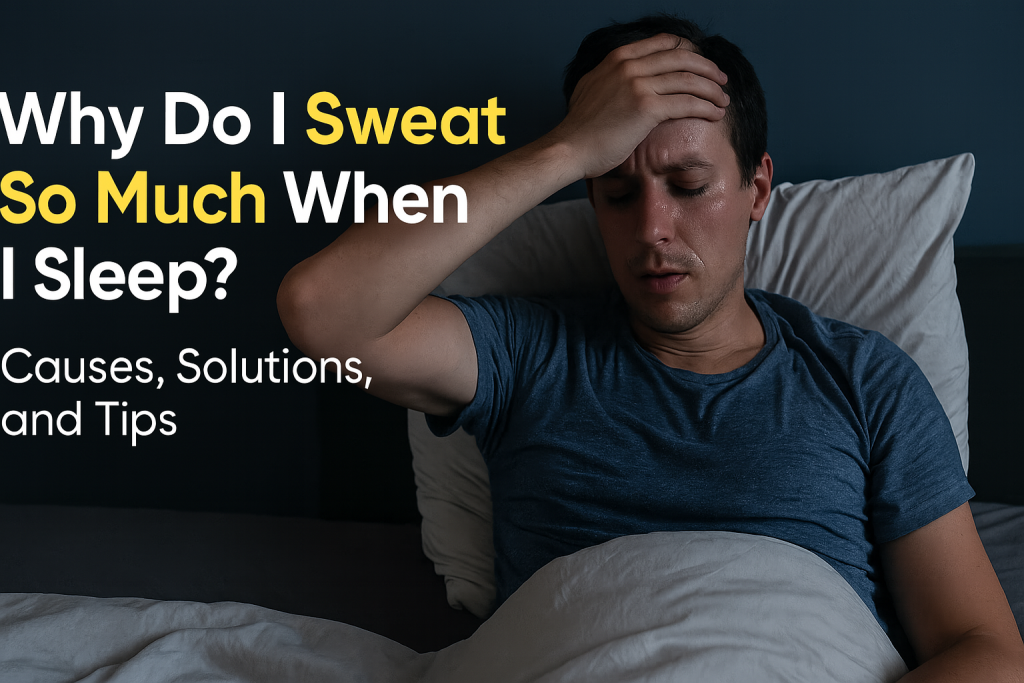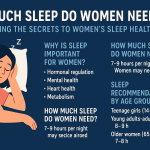Waking up drenched in sweat can be a frustrating and uncomfortable experience. Many people find themselves frequently asking, “Why do I sweat so much when I sleep?” Sweating at night, also known as night sweats, is a common concern that can disrupt sleep quality and sometimes indicate underlying health issues. In this comprehensive guide, we’ll explore the possible causes of excessive sweating during sleep, health implications, and practical solutions for a cooler, more comfortable night’s rest.
Understanding Night Sweats
Night sweats refer to excessive sweating during sleep that often soaks pajamas and bedding. It’s important to distinguish between normal sweating related to a warm bedroom or heavy blankets, and persistent night sweats that occur regardless of your sleep environment.
How Much Sweating is Normal During Sleep?
It’s normal to sweat a little during sleep as your body regulates temperature. However, if you wake up frequently drenched or notice that night sweats are interfering with your sleep, it may be time to consider the underlying reasons.
Common Causes of Sweating at Night
There are many reasons why someone might sweat excessively while sleeping. Let’s look at some of the most common causes:
1. Bedroom Environment
- High room temperature: Sleeping in a warm room or with excessive bedding can trap heat and trigger sweating.
- Poor ventilation: Lack of airflow can make rooms stuffy, causing your body to sweat more as it tries to cool down.
- Heavy or synthetic bedding: Blankets and sheets made from non-breathable materials can increase body heat retention.
2. Stress and Anxiety
Psychological factors like stress and anxiety can activate the body’s fight-or-flight response, leading to increased sweating even during sleep.
3. Hormonal Changes
- Menopause: Hot flashes and hormonal fluctuations often cause women to sweat at night.
- Puberty: Pubescent teens may experience increased sweating due to hormonal surges.
- Thyroid disorders: Conditions like hyperthyroidism can increase metabolism, resulting in excessive sweating.
4. Medical Conditions
- Infections: Night sweats can be a symptom of underlying infections such as tuberculosis or endocarditis.
- Sleep disorders: Conditions like sleep apnea have been linked to increased night sweating.
- Diabetes: Blood sugar fluctuations, especially nighttime hypoglycemia, can trigger sweating.
- Cancer: Certain cancers, particularly lymphoma, may present with persistent night sweats.
5. Medications and Substances
- Antidepressants: Some medications for depression are known to cause night sweats as a side effect.
- Fever reducers and pain relievers: Drugs like aspirin or acetaminophen can sometimes lead to increased sweating.
- Alcohol and caffeine: These substances can increase your body’s propensity to sweat.
6. Idiopathic Hyperhidrosis
This is a condition where the body chronically produces excessive sweat without an identifiable medical cause, often affecting both day and night.
Health Implications of Night Sweats
Occasional night sweats are typically harmless, especially if they are related to environmental factors. However, persistent or severe night sweats can be a sign of underlying health problems that require medical attention. If you experience additional symptoms such as fever, unexplained weight loss, or fatigue, consult your healthcare provider promptly.
How to Stop Sweating So Much During Sleep: Practical Solutions
Addressing night sweats starts with identifying and tackling the underlying cause. Here are some effective strategies to help reduce or prevent excessive sweating at night:
1. Optimize Your Sleep Environment
- Lower the room temperature: Set your bedroom thermostat between 60-67°F (15-19°C) for optimal sleep comfort.
- Use breathable bedding: Switch to sheets and blankets made of natural fibers like cotton, bamboo, or linen.
- Fans and air conditioning: Improve airflow and circulation with a fan or AC unit.
- Wear lightweight pajamas: Choose loose-fitting sleepwear made from moisture-wicking, breathable fabrics.
2. Adjust Your Lifestyle and Bedtime Habits
- Limit spicy foods and caffeine: These can increase body temperature and trigger sweating.
- Avoid alcohol before bed: Alcohol can dilate blood vessels and increase sweating.
- Stay hydrated: Drinking water helps regulate body temperature.
- Establish a calming bedtime routine: Reduce stress with relaxation techniques such as meditation or deep breathing exercises.
3. Review Medications
If you suspect your medication is causing night sweats, don’t stop taking it abruptly. Instead, talk with your doctor about possible alternatives or adjustments.
4. Manage Medical Conditions
If night sweats are due to a health issue like sleep apnea, diabetes, or hormonal imbalances, work with your healthcare provider to address the root cause. Proper management can often reduce or eliminate night sweats.
When Should You See a Doctor About Night Sweats?
It’s always wise to talk to a healthcare provider if:
- Night sweats are persistent and unexplained.
- You experience associated symptoms like high fever, weight loss, or fatigue.
- You notice new symptoms or changes in your health status.
- Night sweats interfere with your sleep or quality of life.
A doctor can perform appropriate evaluations, such as blood tests or sleep studies, to help determine the underlying cause and recommend a tailored treatment plan.
Frequently Asked Questions About Sweating in Sleep
Are night sweats common?
Yes, occasional night sweats are quite common and can affect people of all ages, often due to environmental factors or temporary illnesses.
Can changing my diet help with night sweats?
Avoiding spicy foods, caffeine, and alcohol in the evening can help reduce night sweats for many people.
Is sweating at night dangerous?
In most cases, sweating at night is not dangerous. However, if it occurs alongside other symptoms or is severe, it may indicate a more serious condition.
Conclusion
Waking up sweaty at night can be distressing, but there are many possible reasons for this phenomenon, ranging from benign environmental factors to medical conditions. By understanding the causes and implementing simple lifestyle changes, you can often reduce or eliminate night sweats. If you’re concerned or notice other symptoms, seek medical advice for a proper diagnosis and treatment plan. Rest assured, you are not alone—and help is available to ensure you enjoy a peaceful and sweat-free night’s sleep.


